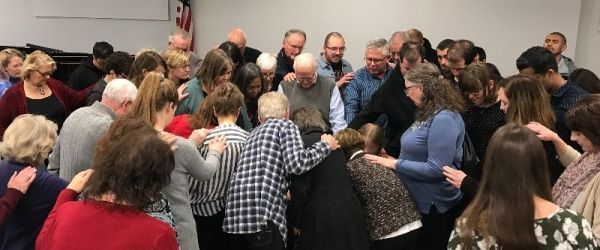
Explore panel: 'What role did your church play in your journey?'
Vision, training, and encouragement
 Our sending church played many roles in our journey to Siberia. First, the church instilled in us a desire for organic, small-group-oriented ministry built on relationships that also had a core value of multiplying. This helped us to concentrate on finding an organization that was also passionate about church planting and multiplication.
Our sending church played many roles in our journey to Siberia. First, the church instilled in us a desire for organic, small-group-oriented ministry built on relationships that also had a core value of multiplying. This helped us to concentrate on finding an organization that was also passionate about church planting and multiplication.
As my wife and I both participated in an internship program at the church, we were encouraged to grow into the ministries God was calling us to. They gave us many opportunities to minister in the US and to be trained for ministry.
The leadership within the church believed that we were called to cross-cultural ministry and encouraged us to be church planters sent out by them to the foreign mission field. There was a core group of people in the church that prayed for us as we prepared to go, and advocated for our financial needs.
Discipleship and ministry experience
 I had the privilege of being discipled by two women who had experience working overseas, and even though that was close to 10 years ago, I continue to reflect on that time with gratitude and joy. One of them said, “The best preparation for the mission field is right now.” I joined the missions committee at my sending church, and I would encourage you to get involved: join a small group, serve in the children's or youth ministry—this time of “in-between” is formative for what is coming!
I had the privilege of being discipled by two women who had experience working overseas, and even though that was close to 10 years ago, I continue to reflect on that time with gratitude and joy. One of them said, “The best preparation for the mission field is right now.” I joined the missions committee at my sending church, and I would encourage you to get involved: join a small group, serve in the children's or youth ministry—this time of “in-between” is formative for what is coming!
Short-term opportunities and connection
 I had the privilege of being discipled by two women who had experience working overseas, and even though that was close to 10 years ago, I continue to reflect on that time with gratitude and joy. One of them said, “The best preparation for the mission field is right now.” I joined the missions committee at my sending church, and I would encourage you to get involved: join a small group, serve in the children's or youth ministry—this time of “in-between” is formative for what is coming!
I had the privilege of being discipled by two women who had experience working overseas, and even though that was close to 10 years ago, I continue to reflect on that time with gratitude and joy. One of them said, “The best preparation for the mission field is right now.” I joined the missions committee at my sending church, and I would encourage you to get involved: join a small group, serve in the children's or youth ministry—this time of “in-between” is formative for what is coming!
A trip with my church in high school to serve the homeless sparked my desire for global work. As I grew older, and God revealed more of my passions, the church was there as a support system. We had a monthly group for those interested in missions. This group had a wide variety of people, ranging from those who love to pray for missionaries to retired missionaries to those just starting to consider missionary service to those who had raised their funds and were packing their boxes!
Support, prayer, and education
 Our church got behind us in prayer and finances very early in the process. They also had a Perspectives Course, which really helped us see things through God's eyes.
Our church got behind us in prayer and finances very early in the process. They also had a Perspectives Course, which really helped us see things through God's eyes.
(Check out www.perspectives.org
to find a class near you.)
Theological preparation and discernment
 Your local church can help you discern your calling, prepare you theologically, pray for you, help send you financially, and commission you to the field. Our church did all of those things. Your church should be as involved as possible in the sending process. Along the way, you will all learn of things you could have done better in the process—show each other grace as you grow!
Your local church can help you discern your calling, prepare you theologically, pray for you, help send you financially, and commission you to the field. Our church did all of those things. Your church should be as involved as possible in the sending process. Along the way, you will all learn of things you could have done better in the process—show each other grace as you grow!
When you discuss your interest in missions with your church leaders, how have they encouraged you to pursue God's leading? We'd love to know! Click below to connect with a SEND mission coach!
The path to missions can feel overwhelming! Our experienced mission coaches will walk alongside you every step of the way.

• Find out how you can become a SEND missionary.
• Explore where and how you can serve with SEND.
• Subscribe to Explore News , to hear real-life stories from our missionary panelists every month.
Additional Posts





